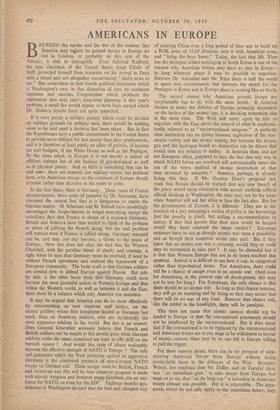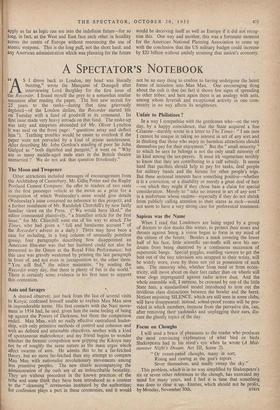AMERICANS IN EUROPE
BETWEEN the smoke and the fire of the rumour that America may reduce its ground troops in Europe no one in London, or probably on this side of the Atlantic, is able to distinguish. Even Admiral Radford, the new chairman of the United States Joint Chiefs of Staff, protected himself from reporters on his arrival in Paris with a dazed and not altogether unconvincing " that's news to me." But somewhere in that fourth political dimension which is Washington's own, in that distortion of time by confident reporters and anxious Congressmen which produces the impression that next year's long-term planning is this year's problem, a small fire would appear to have been started which Mr. Dulles's denials have not quite quenched. • If it were purely a military matter, which could be decided on military grounds by military men, there would be nothing more to be said until a decision had been taken. But in fact the Republicans have a public commitment in the United States to provide more defence for less money than their predecessors, and it is therefore at least partly an affair of politics, of income. tax and budgets, of the White House as well as the Pentagon. By the same token, in Europe it is not merely a matter of efficient defence but of the balance of psychological as well as of physical power. And so there is something that can be said now : there are reasons; not military secrets but political facts, why American troops on the continent of Europe should increase rather than decrease in the years to come.
In the first place, there is Germany. Three years of French procrastination, three yedrs of patience by Dr. Adenauer, have obscured the central fact that it is dangerous to rearm the German nation. M. Schuman and M. Bidault have unwittingly encouraged the Anglo-Saxons to forget everything except the subsidiary fact that France is afraid of a rearmed Germany. Britain and America have thus tended to think of the problem in terms of jollying the French along, but the real problem will remain even if France is jollied along. Germany rearmed can be, and may one day become, a threat to the peace of Europe. Now this does not alter the fact that Sir Winston Churchill, with his peculiar blend of clarity and courage, is right when he says that Germany must be rearmed, if need be without French agreement and without the framework of a European community. The brute truth is that German soldiers are needed now to defend Europe against Russia. But side by side, is the other brute truth that Germany could soon become the most powerful nation in Western Europe and that within the Western world, as well as between it and the East, there must be a balance which only America can maintain.
It may be argued that America can do so more effectively by concentrating on new weapons and tactics, on the atomic artillery whose first instalment landed in Germany last week, than on American soldiers, who are incidentally the most expensive soldiers in the world. But this is no answer. Does General Gruenther seriously believe that French and British soldiers can be taught to fire atomic guns while German soldiers under the same command are kept at rifle drill on the barrack square ? And would this state of affairs noticeably increase the effective strength of NATO in Europe ? The only real guarantee which the West possesses against an aggressive Germany is the continued presence of non-German NATO troops on German soil. These troops must be British, French and American and this will be true whatever progress is made with atomic weapons and however many Germans put on uni- forms for NATO, or even for the EDC. Eighteen months ago, someone in Washington decided that the best and cheapest way of resisting China over a long period of time was to build up a ROK army of 15-20 divisions, arm it with American arms, and " bring the boys home." Today, the fact that Mr. Rhee has the strongest armed contingent in South Korea is one of the reasons why American troops may have to stay in Korea— to keep whatever peace it may be possible to negotiate. Between Dr. Adenauer and Mr. Rhee there is half the world in space and circumstance; but between the moral for the Pentagon in Korea and in Europe there is nothing like so much.
The second reason why American ground troops are irreplaceable has to do with the atom bomb. If America decides to make the defence of Europe primarily dependent on the tactics of the atomic age, it is deciding something else at the same time. The West will never again be free to negotiate with the East about the control of what is euphemis- tically referred to as " unconventional weapons." A perfectly clear distinction can be drawn between explosives of the non- atomic variety and the atomic variety; but between the atomic gun and the hydrogen bomb no distinction can be drawn that would bear any relation to reality. Is America then, and are her European allies, prepared to face the fact that any war in which NATO forces are involved will automatically mean the use of the worst method of atomic destruction at that time invented by scientists ? America, perhaps, is already facing this fact. If Mr. Gordon Dean's proposal last week that Russia should be warned that any new breach of the peace would mean retaliation with atomic methods reflects official thinking in Washington, the time may not be far away when America will ask her allies to face the fact also. But for the governments of Europe, it is different. They are in the position of a jury returning a verdict of guilty in the knowledge that the penalty is death, but adding a recommendation to mercy; if they had known that their man would be hanged would they have returned the same verdict ? European ministers have to act as though atomic war were a possibility and as though their countries would take part. But if they ' knew that an atomic war was a certainty, would they or could they be committed to take part ? It may be shameful but it is true that Western Europe has not in its heart resolved this question. Indeed it is difficult to see how it can, in categorical rather than hypothetical terms. For Americans, there could still be a chance of escape even in an atomic war. (And even for Americans, at the present rate of development, this may not be true for long.) For Europeans, the only chance is that there should be no atomic war. So long as that chance remains. they will go on rearming and by doing so they may secure that there will be no war of any kind. Remove that chance and, like the rabbit in the headlights, there will be paralysis.
This does not mean that atomic cannon should not be landed in Europe or that the conventional armaments should not be reinforced by the unconventional. But it does mean that if the conventional is to be replaced by the unconventional and American troops are at any stage to be withdrawn in favour of atomic cannon, there may be no one left in Europe willing to pull the trigger.
For these reasons alone, there can .be no prospect of with- drawing American troops from Europe without doing incalculable harm to the defences of the West. Secretary Wilson, less emphatic than Mr. Dulles, said on Tuesday there was " no immediate plan " to take troops from Europe, but went on to say that " in the long run " a reduction in American troops abroad was possible. But it is impossible. The argu- ments above do not only apply to the immediate future; they apply as far as logic can see into the indefinite future—for so long, in fact, as the West and East face each other in hostility across the centre of Europe without renouncing the use of atomic weapons. This is the long pull, not the short haul; and any American administratibn which was planning for the future would be deceiving itself as well as Europe if it did not recog- nise this. One way and another, this was a fortunate moment for the American National Planning Association to come up with the conclusion that the US military budget could increase by $20 billion without unduly straining that nation's economy.



































 Previous page
Previous page